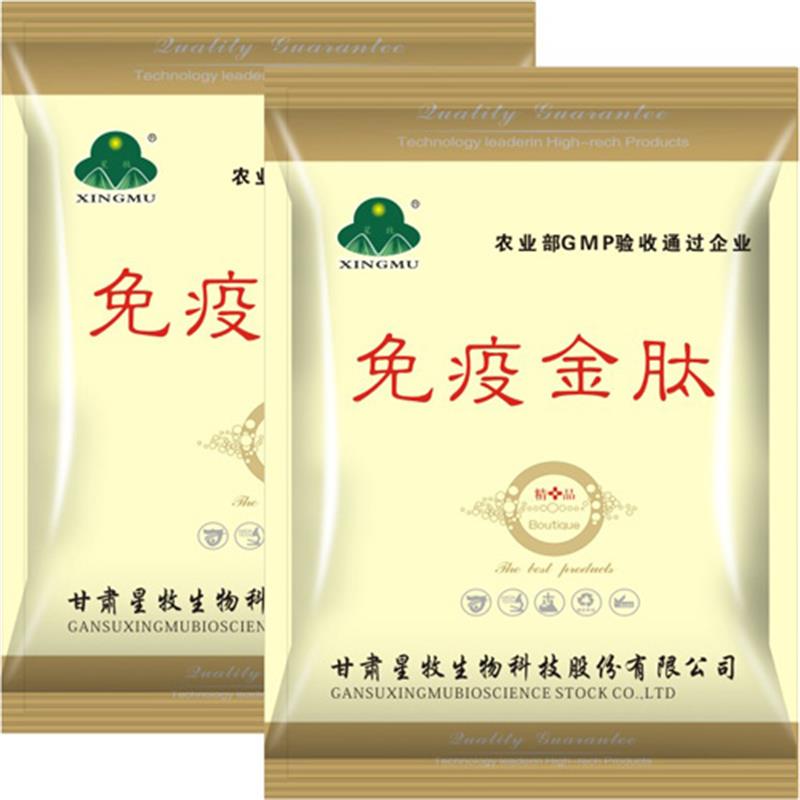Product Descriptio
Other Names: Immune gold peptide
Packing: 1000g/ bag
Specification:1000g(live bacteria content not less than 32 billion/g)
Usage: Improve disease resistance, adjust gastrointestinal ph.
| ◇Immune gold peptide (for livestock and poultry)◇ | ||
| [Mechanism] 1. Improve disease resistance, regulate gastrointestinal pH, improve the intestinal environment, and prevent diseases: produce a large amount of lactic acid, adjust the balance of gastrointestinal flora of livestock and poultry, inhibit the reproduction of harmful microorganisms, and significantly reduce the pH of the gastrointestinal tract. Promote the antibody level and macrophage vitality in the animal body, and enhance the body's immunity. 2. Improve feed conversion rate, reduce feed cost, and promote animal growth: it can metabolize and produce a large number of digestive enzymes in the animal body, optimize the multi-enzyme digestion system of the gastrointestinal tract, and participate in protein metabolism, energy metabolism, mineral element metabolism and vitamin metabolism. , It can increase the feed conversion rate by more than 10%. 3. Improve the environment and reduce pollution: decompose the organic matter in the feces, eliminate ammonia nitrogen and nitrite, reduce the odor of animal feces and improve the sanitation of the pen. [Characteristics] 1. After using for 5-7 days, the feces will gradually become lighter, firmer and dry from the original blackening, throwing and swelling (copper poisoning). Enhanced), the corn kernels and soybean meal particles in the feces become finer and smaller until they disappear. 2. After 7-10 days of use, the pig’s health improves, the spirit is better, the skin is rosy, the coat is shiny, and the amount of activity is reduced. , No biting, prevent peeling and hair loss, reduce piglet anemia, tremor, and eliminate stiff pigs. 3. After 15 days of use, the animal's body can reduce about 50% of harmful products, effectively reduce the ammonia, hydrogen sulfide and other harmful gases produced by the animal's excretion, improve the internal environment of the livestock house, and reduce the occurrence of high fever and respiratory diseases. 4. Prevent stress caused by transportation, group transfer, circle separation, season change, high temperature and high fever, and change of feed. It has an excellent auxiliary treatment effect on high fever and respiratory diseases, accelerates the excretion of pathogenic bacteria in the body, and speeds up the recovery of the disease 5 . The piglets produced by the pigs fed with immune gold peptides are large, uniform, and have an average weight of 1800-2000 grams. [Usage and Dosage] Based on the original full price formula, per 1000 grams of immune gold peptide: small pig (30-60kg) mixed with 1000 kg, medium pig (60-120kg) with 2400 kg, large pig (120kg- for slaughter) Mix 2000 kg. Using activating immune peptides throughout the process, each pig can save 50 kilograms of feed. Beef cattle and dairy cows are based on the original formula for 2000-3000 kilograms of activating immune peptides per 1000g, and foxes and raccoons are 1600-2000 kilograms per 1,000g of activating immune peptides based on the original recipes. |



Packaging & Delivery
Packaging Details:25kg/bag
Port :qingdao
Lead Time:
Quantity(bag) | 1 - 20 | >20 |
Est. Time(days) | 15 | To be negotiated |

Gansu Xingmu Biotechnology Co., Ltd. is located in baiyin High-tech Industrial Park of Chinese Academy of Sciences in Baiyin City, Gansu Province, a pharmaceutical base in northwest China.
Company in early 2005 by the returned students from Germany, and German DGA leading raw materials research and development manufacturing group, a joint China chemical industry research institute, northwest agriculture and forestry university of science and technology, Chinese academy of agricultural sciences, lanzhou veterinary research institute, nanjing agricultural university joint construction, the company with total investment of the people (excluding land) to 73.6 million yuan, existing staff 416 people, Among them, there are 5 returned doctors, 28 senior professional titles, 36 intermediate and master's students, and more than 93% of the total staff are professional and technical personnel. In particular, an advisory panel composed of experts in the field of veterinary medicine was hired.
